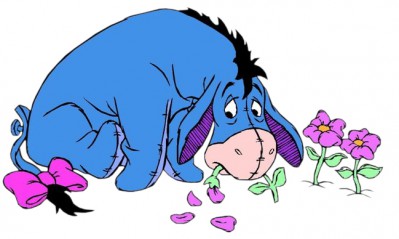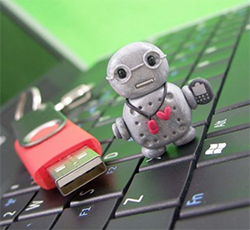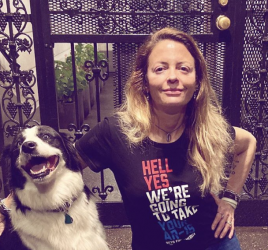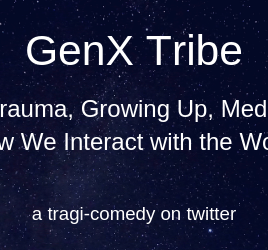The Tigger Talk: On Life, the Process, and Everything
Grades don’t matter.
This is what I tell my students ever week throughout the school year. Education is about the process, I tell them as they roll their eyes, not the product. I implore them to focus on squeezing out every bit of knowledge from their assignments. I want them to attack uncertainty without fear of failure. I encourage them to fail.
Because in failure we learn.
But the truth is that even those students who try – try – to focus on learning and not grades still fall victim to that red letter penned upon their assignments. I can see it in their eyes, the smiles that beam across their face when they earn As and the sunken, silent despair when they earn Fs.
I want to grab each of them, look them in the eyes, and remind them that grades don’t matter. In class or in life. What matters is the process. What matters is the way you approach your education, your relationships, and your life.
Of course I can’t convince my students to think this way. Too much of our educational system is built around grades. So I do the only thing that I can: I tell them my story.
This is The Tigger Talk.
* * *
Part 1: On Life
Grades don’t matter. I’ve told you that throughout the semester. Before every assignment. After every assignment. Grades are simply irrelevant to what you have learned and what you know.
I’ve told you this but I haven’t told you why I know this. Today I am going to do that.
In ten years when you look back upon your college life, you’re going to realize that you can’t remember the names of many of your very good friends. You won’t remember the lessons you’ve learned in these classrooms. You won’t even remember the name of the terrifying professor who made you come to every class, cursed at you, and made you do your work over, and over, and over.
You’ll forget these things because life is very big and very fast. It takes you places, like a raging river, you never expected to go.
You will leave this safety net and immediately find yourself within the raging rivers of life, swept away before you’ve even had time to brace yourself. You will find that apartments cost money. And so does water. And trash. And insurance. You will find that your money goes out nearly as quickly as it comes in.
You will find yourself getting up at 630 AM, eating breakfast, driving to work, working until 530 PM (if you’re lucky), fighting traffic on the way home, where you make dinner, before you clean up and check your messages, and finally sit down sometime around 830 PM. Fourteen hours after you left home.
You will mean to go out. You will mean to try to make new friends to replace the ones you lost after college. You will mean to read that book sitting by your bed. You will mean to call your friends from home. You will mean to schedule that vacation to see your best college buddy.
However, you will be tired. You will find you only have 14 days of vacation time. You will find that life is very big and very fast.
I tell you this today not to scare you. Many people exist in this fast paced world and do quite well. They manage their time. They find their home. They navigate the planet quite successfully.
It doesn’t happen by accident.
You have to make decisions with your life.
Part 2: On Eeyore
 I’m about to describe a person whom you all know. It’s a person who exists within everyone’s circle of friends. If you can’t imagine who this person is, I would suggest that this person might be you. Regardless of who it is, I think you’ll recognize this type of person.
I’m about to describe a person whom you all know. It’s a person who exists within everyone’s circle of friends. If you can’t imagine who this person is, I would suggest that this person might be you. Regardless of who it is, I think you’ll recognize this type of person.
There is a person who sucks the air out of the room. The person who always has a problem. The person who is constantly surrounded by drama. Drama, mind you, that they are convinced they have no part in creating. They are simply at the mercy of the forces around them.
They are un-help-able. Every piece of advice you offer them is returned with statements like: “That won’t work because…” or “You just don’t understand…” or “I don’t have any control…”
They are Eeyore, the sad-sack sidekick from Winnie-the-Pooh.
When you’re young and you have patience and energy, these types of people are the projects of your life. These are the people you will change. You. Will. Save. Them.
As you get older, you have less time and less energy. You begin to pull away from these kinds of people. You begin to measure out your time with them, planning meticulously so that they don’t invade the small bits of time that are yours.
You screen phone calls. You don’t return text messages. You slowly move them out of your life and into a special place away from everything else.
It’s important to remember this piece of information, though, because it’s the key to everything I am going to share with you today: Nobody wakes up in the morning and thinks, “I want to be a downer today.”
The fact is these people were at one time in their lives very happy, very smiley, very cute little babies with their whole lives in front of them. At one point in time, they were a child who ran through the grass. A young adult who fell hopelessly in love with someone.
At one point they stood at the edge of a world where anything was possible.
So the question is this: how did they become the way they did?
Part 3: On Decisions
On May 11, 2008 I awoke in the Campbell County Detention Center, dripping in the piss of another visitor to the lockup.
As my eyes opened, two horrifying thoughts rushed through my head: “If I have killed somebody, I am going to kill myself” and “You have thrown away everything in your life that you have ever worked to get.”
I hadn’t actually killed – or even hurt – anyone. I had been arrested for Driving While Intoxicated, miraculously for the first time in my long and storied drinking career. As the first wave of fear washed over me and I realized that I hadn’t hurt anybody, the second wave of loneliness crashed across me.
The reason: I was sitting in jail, alone, and the friends I’d gone out with that night had left me. Moreover, I couldn’t think of anyone whom I was close enough with to call to come and get me from the County lock up. In the place I’d grown up. In the place where I couldn’t go anywhere without running into someone I knew. In this place I’d returned after 12 years on the road, I didn’t have anyone who I felt could help me.
I was alone because of the decisions I’d made in my life. The decisions I’d made from the beginning of my journey into the world. The small decisions that I made every day. The ones where I put my friends aside, my relationships aside, anything aside that didn’t relate to my career.
I was a small town kid from Northern Appalachia, I rationalized. If I was going to make it, I couldn’t let anything or anyone get in my way.
The product was more important than the process.
At every turn from the time I graduated college in 1994 until the moment I awoke in that jail cell in 2008, I made my life decisions based upon the product of life.
If you looked at my C.V., if you judged me in that way, I’d done okay. I earned a Masters degree from Cal-Berkeley, I worked at Wired magazine, I wrote a book for McGraw-Hill, I worked at M.I.T., and I’ve done work with Carnegie Mellon and countless other high profile schools and organizations.
In the world I lived in, I had done quite well in terms of the product.
As I lay in the small stream of piss in the County jail, it dawned on me that maybe I’d been doing life wrong. I wasn’t entirely sure how I had been doing it wrong, but I was smart enough to realize that whatever right was…this wasn’t it.
The day wore on and I began to panic. In just a few hours, I would be moved into the prison population until my court appearance on Monday unless I could find someone to pick me up. Reluctantly, I had the desk clerk call my parents.
It’s important at this moment to note two things: May 11, 2008 was Mother’s Day and my mother, a wonderfully caring woman who made sure I never wanted for any kind of affection or attention, had dealt with two horrible losses in her life because of drugs and alcohol.
In the moments before she picked up the phone (I was not allowed to handle the phone because I was in jail so this was done by an intermediary), the selfishness of my life washed across me. In that moment, there was no place to run from who I had become.
The decisions that I made along the way, the ones that I let pass because I thought they were just innocuous, unconnected events, suddenly crashed down upon me.
I had become the person that nobody wanted to be around.
Part 4: On Changing Everything
The events of my life are of no great consequence to most of you today. They are easily dismissed as the poor decisions of an addict. In that analysis, you are correct. My life is mine. My mistakes are mine. They are not yours. You are not destined to become the kind of person I became.
That’s not the point of this story, though. The story is about how people become something they didn’t mean to become. The story is about how the little decisions you make every day, the compromises you will make with yourself, eventually change and shape the person you are.
I tell you this story because life isn’t about big events. Life is about small events. Very tiny, small events that happen thousands of times a day. Events that don’t even appear to be strung together. Yet these events – these decisions – add up over time and become the sum of our person.
If we say no enough, if we find reasons not to enough, and if we look for reasons that we are different enough, we eventually become the sad, lonely person for whom life seems to work against. We wake up one day, 15 years down the road, and wonder why nobody wants to be around us.
Which brings us to the actual point of this story:
You can’t control the events of your life. You can’t control what somebody thinks. You can’t control anything around you.
In fact, of everything that happens in life there is only on thing that you can ever control: you control how you view the world.
I read books about people who have overcome adversity, such as Vietnam veterans who were held in prison camps or people like Nelson Mandela, who was a political prisoner for decades. I am fascinated by how the human spirit is able to survive and thrive within sub-human conditions.
In every one of these books, the authors say the same thing: these people all kept a positive outlook, even in the face of horrifying conditions. The took control of the one thing they could, their attitude, and used that to maintain their humanity.
The simple act of deciding in every moment that life is good can change everything.
Part 5: On Tigger
 All of which brings us back to grades, why they don’t matter, and how decisions mean everything.
All of which brings us back to grades, why they don’t matter, and how decisions mean everything.
If you believe my philosophy about life – that how you view each and every day shapes the kind of person that you do – then suddenly end products, grades, don’t matter as much anymore. You begin to understand that giving your very best effort, pushing yourself to your limits, and failing is an act of courage. You begin to understand that the simple act of trying when the outcome is uncertain is a victory in and of itself.
You begin to see hurdles, as Randy Pausch said, instead of roadblocks.
You begin to see life as Tigger, the always-upbeat, mischievous fun-bringer from Winnie-the-Pooh.
If you make the simple decision in every moment to see the world as full of possibilities instead of roadblocks, and if you see the world as full of similarities instead of differences, and if you see the world as full of potential and not terror, you will find yourself blessed with a very full life.
I don’t know what the product of that life will be. Nobody does. We can’t control the events of our lives. The river rages; bad things may happen. But those won’t be the sum of your life.
I promise you this because you can control how you think. You can control how you choose to see those events. You can choose how you add up your life.
That little, simple idea is the one thing nobody can ever take away from you.
If you think positively, if you take the time every day to find the good and not the bad, I can tell you what the process of your life will be.
You will be the kind of person who people want to be around. You will be the kind of person who people come to when they need help. You will be the kind of person that fills the room full of energy when you arrive.
You will be, in other words, the kind of person that you were when you were a little kid running through the grass; the kind of person you were when you first fell in love; and the kind of person you were when you stood at the beginning of you life, filled with nothing but potential.
You will be Tigger.




Thanks, dude. You rock. Way to go, to get Jane Friedman to like your post!
Well I think she’s being kind. But I appreciate the love anyway. I’m a writer. We crave attention and praise 🙂
Phenomenal speech. Very uplifting. Thank you.
Thanks Lorraine. It’s a draft of the talk, which changes every time I give it. I appreciate your comment. It’s quite nice.
I remember sitting in your ethics class, and sitting in your office asking for help to improve my GRADES. I also remember you telling me those grades don’t matter, in which I completely ignored, because if they didn’t you wouldn’t have given them 🙂 However, a year and a half later as I sit at my work desk and read your speech, every point hits home. Had I not been able to embrace the smaller events in my life I never would have been able to enjoy the big ones when they happened.
I hope your students hear this speech and it stays with them in the years to come. If it does, like me, a year later, they still will remember the teacher who cussed at them the first day of class, pushed them to their limits, and most importantly, helped them see the big picture of getting through life.
Thanks 🙂
Ah Jasmine I do remember our rocky start 🙂 And I remember you coming into my office about halfway through the semester worried about your grades. I’m glad Tigger has stayed with you + even happier that you’ve started to find your way out in the world.
Like the hokey pokey, that’s really what it’s all about 🙂
You are a force of nature, hombre, and I miss you.
thanks dude. while I don’t miss nku, I do miss some of the people. if you were wondering, you are one of those “missed” people. 🙂
You are a force of nature, hombre, and I miss you.
Brad – Brilliant. Thank you for sharing. You are a force of nature indeed, as Chris says below.
Thanks Carrie. I’m not sure if I’m a force of anything. I’m just a big bull in a little china shop.
Brad- Such a great piece, so true! Hope you are doing well.
Thanks Shiloh. It’s truly my favorite lecture of the year. I am well. I’ve been dying over the Knowles awesome baby pictures and wondering when I can get back to England to see him!
Very inspirational. I was always a goal-oriented person (well, I’m still, but it gets better) believing that the outcome is the most important thing. After a few years I realized that I’m stressed than anyone else and unhappy with everything I’m doing.
NikolaAdamus One of the most important lessons you can learn, I think, is that when you create stress for yourself, everyone around you feels it as well. Unnecessary expectations can ruin even the best-intentioned actions.
This is my favorite line from this essay: “You’ll forget these things because life is very big and very fast. It takes you places, like a raging river, you never expected to go.”